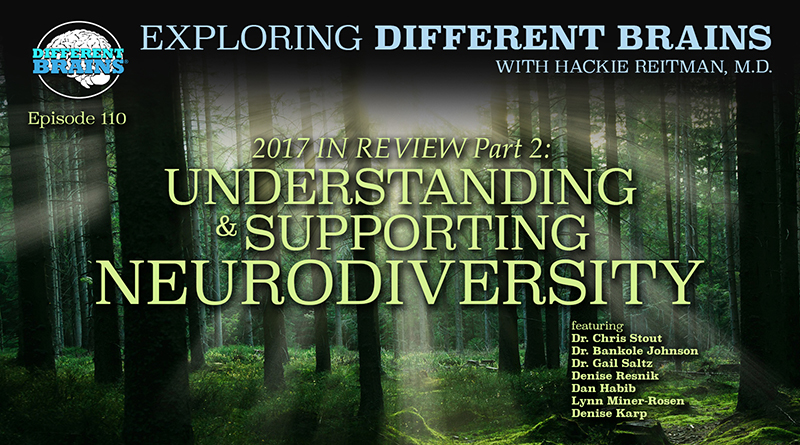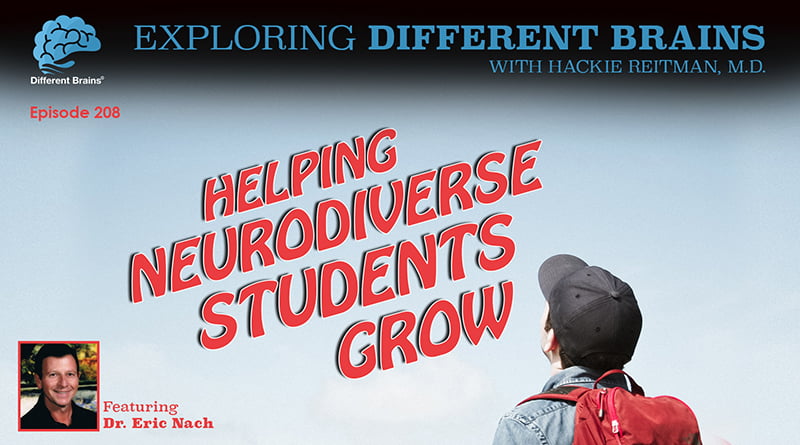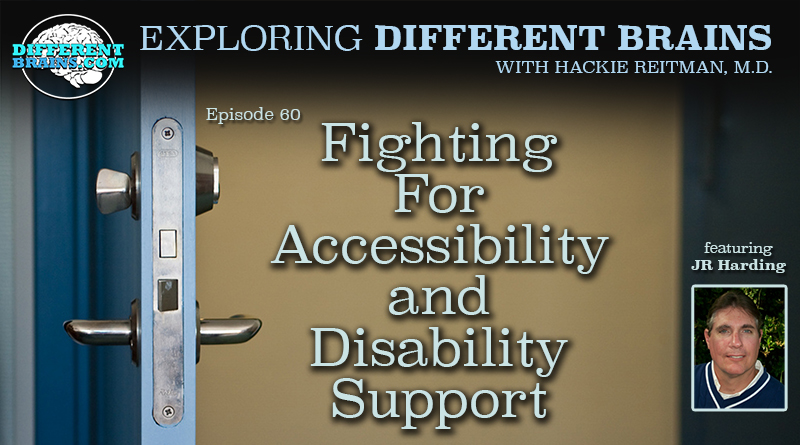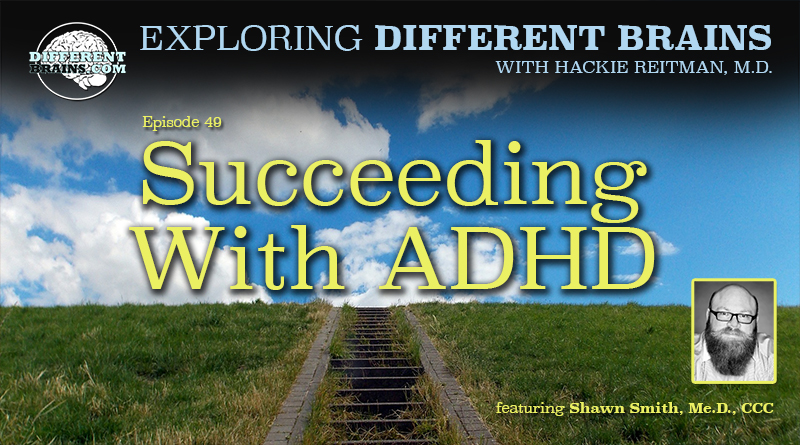
2017 in Review, Part 2: Understanding & Supporting Neurodiversity | EDB 110
(11 mins) In part two of a special two part episode of Exploring Different Brains, Hackie Reitman, M.D. presents words of wisdom from some of the great guests the show has had in 2017. For second first part, we are focusing on the parents, researchers, specialists and advocates that are working to help create a world of acceptance for those of us with different brains: Chris Stout, PsyD. (clinical psychologist, a philanthropist, entrepreneur, author, podcast host, a founding member of the Center for Global Initiatives, and the vice president of research and data analytics for ATI), Bankole A. Johnson, DSc, MD, MBChB, MPhil, FRCPsych, DFAPA, Dip-ABAM, Dip-ABDA, FACFEI (heads the Brain Science Research Consortium Unit [BSRCU] at the University of Maryland School of Medicine, and is one of the world’s leading authorities on the subject of addiction, and was featured on HBO’s addiction), Denise Resnik (Founder, President, and Board Chair of First Place AZ-a nonprofit dedicate to developing new, innovative housing options for adults with autism and other special abilities, as well as co-founder of SARRC [Southwest Autism Research & Resource Center]), Dr. Gail Saltz (Clinical Associate Professor of Psychiatry at the New York Presbyterian Hospital Weill-Cornell Medical College, a psychoanalyst with the New York Psychoanalytic Institute, a columnist, bestselling author, podcast host and television commentator and one of the nation’s foremost go-to experts on a variety of psychological and mental health issues ), Lynn Miner-Rosen, M.Ed., BCC, CDCS (Board Certified ADHD Coach and Career Coach for College Students and Young Adults), Denise Karp (parent to a son with autism, autism advocate, and founder of the yahoo autism parent’s group Denise’s List), Michael Alessandri (Executive Director of the University of Miami-Nova Southeastern University Center for Autism and Related Disabilities [UM-NSU CARD]), and Dan Habib (disability advocate, parent to a son with Cerebral Palsy, creator of the award-winning documentary films Including Samuel, Who Cares About Kelsey?, Mr. Connolly Has ALS, and many other short films on disability-related topics).
For more information about our guests:
Dr. Chris Stout
Full Interview:
https://differentbrains.org/helping-different-brains-around-world-dr-chris-stout-edb-106/
Dr. Bankole Johnson
Full Interviews:
Denise Resnik
Full Interview:
https://differentbrains.org/housing-autism-spectrum-denise-resnik-first-place-az-sarrc-edb-101/
Dr. Gail Saltz
Full Interviews:
https://differentbrains.org/power-different-appreciating-talent-neurodiversity-dr-gail-saltz-edb-79/
https://differentbrains.org/discovering-gifts-different-brains-dr-gail-saltz-edb-80/
Lynn Miner-Rosen
Full Interview:
https://differentbrains.org/achieving-goals-adhd-lynn-miner-rosen-edb-105/
Denise Karp
http://yahoo.groups.com/deniseslist
Full Interview:
https://differentbrains.org/denises-list-empowering-parents-children-autism-denise-karp-edb-90/
Michael Alessandri
Full Interviews:
https://differentbrains.org/uniting-autism-community-dr-michael-alessandri-um-nsu-card-edb-76/
Dan Habib
Full Interviews:
https://differentbrains.org/raising-child-cerebral-palsy-dan-habib-edb-102/
.
67 Second Preview:
To listen or download the podcast version of this episode, see the embedded player below.
Or look for us on your favorite podcast provider:
iTunes | Stitcher | SoundCloud
[expand title=”View Full Transcript”]
HACKIE REITMAN, M.D. (HR): Hi I’m Dr. Hackie Reitman. Welcome to the second part of our special two part episode of Exploring Different Brains. What we are doing is we are taking the highlights of the amazing interviews of 2017 with neurodiversity leaders from all over the world…and in this second part we are going to bring you parents, advocates, specialists, and experts from all around the globe to tell us their approach to different brains. We are going to start off with Dr. Christopher Stout, who has helped people all over the world.
HR: …“Health is perhaps the most common denominator in a region’s potential for success as it is so intertwined with economic sustainability, eradicating poverty, preventing war, mitigating violence, and fostering social prosperity.” Can you expound upon that in terms of acceptance of mental health and everything we’re talking about here?
CHRIS STOUT:I had worked at the United Nations 1998-1999 and one of the things that I worked on was the aspect of looking at mental health and substance abuse visa vie sustainable development. And sort of the argument or the thesis that I had in that which relates back to the quote, that you very generously used, was that if without mental health there is no health so to speak. That issues of you can be the needing this kind of assistance regardless of whatever kind of circumstance it’s going to be hard to be a good parent, it’s going to be hard to be a good worker, it’s going to be hard to be a good contributor to your community, or to your tribe, or whatever. And it makes it really ironically I think a fundamental aspect of being successful in every other aspect of one’s life, even if you’re you know biologically so to speak or physically fit or healthy. If you are suffering with debilitating chronic clinical depression, you’re not going to be able to go work, you’re not going to be able to support a family things like that. So that’s the kind of aspect of you know what that point was trying to get to.
BANKOLE JOHNSON: I think it dates back to a few hundred years where people tried to separate the mind from the body as if it were two components of a system that never really talked about another and at least my angle is going to be some higher order type of cognitive thinking and the body was meant to be basically the mechanics and they were not connected so if you’re going to see someone if you have mental health issue people believe that it must be due to this nebulas concept of a mind and that its some how your responsibility or at least partially your responsibility and it has nothing to do with your body. Well we know now that this is completely incorrect. The brain is the most complex organ in the universe, it has connections with you heart, it has connections with basically everything else and to give your friend the heart analogy we now know that individuals who have heart disease often also have mental manifestations of that heart disease and brain stress or distress in the brain is also associated with cardiac arrest and cardiovascular disease. It’s one system. I think some people like to make it simple, but as my professor used to say it can only be as simple as it really is.
DENISE RESNIK: For most of us we’ve had options as our lives have changed as we’ve learned, as we become employed as we’ve had you know have been married and had a life. And so we want more options for people for where they go after they leave their family home and then to allow them to grow to set the bar much higher than it was set for me and for our family when we were told 24 years ago to plan to love, accept, and institutionalize our son because there’s no hope for people with autism. And I committed back then, and I remain committed now that that is not the option, the only option for people with autism there are so many more. And we’re trying to be an example. So that when a child is diagnosed today we can not only tell that family that they can have a job in a home and friends in a supportive community. We can actually show them and what a different lifestyle that represents for a family who’s just had a diagnosis of autism to set the bar much higher than it was set for us. And we all know the difference that hope can make in any of our lives to get out of bed in the morning or get out of the closet or wherever we might be hiding from, to recognize that it is another day, there’s more that we can do and that we can all have greater hope for a future. That’s what all of us deserve.
GAIL SALTZ: It’s so awful to a parent, it’s so stigmatizing and upsetting that, to some degree not consciously but unconsciously, parents don’t notice the symptom because they can’t bear the idea that “maybe my child really has — whatever it is.” I think that if we as a nation could bring in such the same place as you just pointed out, that we bring pancreases, hearts, livers and other organs that we don’t have a problem talking about or going to the doctor for, that parents would recognize what is happening with their child and bring them for the treatment that they need
LYNN MINER ROSEN: I think the biggest thing is to realize that ADHD is not their fault. They’re not lazy, it’s not their fault. They’re not stupid, they’re wonderful, incredible people that need a boost in self-confidence. And they need encouragement, and they need positivity. Their whole life they’re getting “hurry up, stop doing that, do something else, what’s wrong with you, you can do this,” and they’re not given enough positive reinforcement.
DENISE KARP: I guess the biggest challenge is being able to navigate through the land mines of different people with such strong opinions that they maybe they don’t mean to be nasty or insulting but when their own belief system is challenged, they lash out so Denise’s list is a moderated list so that means that I have to approve everything before it goes on this is the reason why it is still here 15 years later because otherwise it would people would have been stalking off in just Kai anger. That is the challenge. Keeping everybody civil and not distributing those posts that are not. I have to read every single one of the posts before it gets distributed.
MICHAEL ALLESANDRI: Who decides what’s beneath or above somebody? Every individual with a disability or not gets to determine where they want to work or how they want to live, it’s not up to us to judge that and I think it’s huge mistake for people to judge being too beneath somebody. That job could be a final job for someone and that could be absolutely brilliant or it could be a stepping stone to some other job once they have learned some fundamental job skills but I can tell you in the car wash, those young adults with autism that are working there are not only earning a wage for the first time in many cases, they have created social relationships with people within their workplace that they never had before. They are going out together on their own, they are hosting events, not with the owners facilitating or coordinating. They have created a social niche for themselves that they didn’t have before. They have developed empathy for their fellow workers, people are volunteering to go and pick someone up who might have to take 2 or 3 buses in order to get there. They would have never have done that before in some cases.
DAN HABIB: You know a lot of my film work is set in schools. And I think teachers work incredibly hard, I have so much respect for them. I mean we’re always asking them to do more and more and more but I think that one of the ways education is changing that helps the neurodiverse population and kids like my son and your child is to do something that’s called Universal Design for Learning, which means just like a building can be universally designed so that anybody can get into it, you know might have accommodations for people who are blind or deaf, have automatic doors people that use wheelchairs, education can be that way there could be a lot of access points. So for instance when my son is in his English class he has great English teachers. They might assign an assignment to him, or to the whole class. They might say, “Listen, you can listen to this, you can watch a video about it, you can do a skit, you can read about it, you can go into the community and learn about it that way.” So you’re giving kids five different ways. So all different learners can find their passion, their way to do it. And then when it comes time to show what you know, you can write a poem you know, perform a little dialogue with somebody, or skit, you can do a short film which Samuel often does as his homework assignments he makes a short video or a film. So I think it’s important to give kids in a school realm lots of different ways to explore those passions, because you know a kid might think they hate history until they watch that documentary that Ken Burns just made on Vietnam, and say “wow history is actually fascinating now that I can experience it this way.”
[/expand]
.
Different Brains® Inc. founder Harold “Hackie” Reitman, M.D. is an author, filmmaker, retired orthopedic surgeon, former professional heavyweight boxer, the past chairman and president (and current board member) of The Boys and Girls Clubs of Broward County, and a neurodiversity advocate. However, it was his role as a father that led to the creation of the DifferentBrains.org website.
Hackie’s daughter Rebecca grew up with epilepsy, 23 vascular brains tumors, and underwent 2 brain surgeries before the age of 5. Her struggles and recovery put him on the road to, through 26 professional heavyweight boxing matches, raising money for children’s charities (to which he donated every fight purse).
Rebecca eventually went on to graduate from Georgia Tech with a degree in Discrete Mathematics, and Dr. Reitman wrote and produced a film based on her experiences there (The Square Root of 2, starring Darby Stanchfield of ABC’s Scandal). After graduation, Rebecca received a diagnosis of Asperger’s syndrome. Hackie, shocked at his own ignorance of the topic despite being an M.D., embarked on years of research that culminated with his book Aspertools: The Practical Guide for Understanding and Embracing Asperger’s, Autism Spectrum Disorders, and Neurodiversity (released by HCI books, publishers of the Chicken Soup for the Soul series).
This experience revealed to Hackie the interconnectedness of the conditions that fall under the neurodiversity umbrella, while alerting him to the in-fighting and fractured relations that often plague the organizations tasked with serving the community. Convinced that overcoming these schisms could help all of society, Hackie forged the Different Brains philosophy of inclusive advocacy: “Supporting Neurodiversity – From Autism to Alzheimer’s and All Brains In Between”.
In the company’s initial years of operation, Hackie self-financed all of the content on DifferentBrains.org, all of which offered free to view to the public. Currently he is the host of our weekly interview show Exploring Different Brains, writes blogs for the site, and tours the country speaking at conferences, conventions and private functions, all with the goal of improving the lives of neurodiverse individuals and their families, and maximizing the potential of those with different brains. Separate from Different Brains, Hackie is the founder and CEO of PCE Media, a media production company focusing on reality based content. He recently co-executive produced the documentary “Foreman”, the definitive feature documentary on legendary boxer and pitchman George Foreman.




